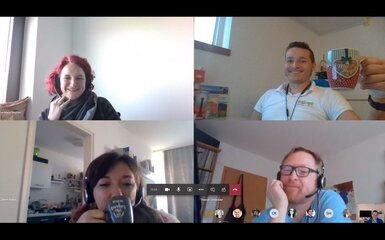Mobile Health: Help for the chronically ill?

Reading time:
minutes
Mobile digital health applications promise far-reaching perspectives and also offer great potential - this is the result of the study "Mobile Heath - With differentiated services to success" by Bitkom and Deloitte. Therapeutic applications for chronically ill people can, according to the study, offer a high benefit - for patients and also for doctors. At present, however, mobile health (mHealth) applications are hardly offered at all - there is a lack of tailor-made offers.
There are hardly any concerns about data protection any more. In order for applications to be offered in therapeutic practices in the near future, the regulatory framework must be defined along the lines of a digital reality. In this context, the traditional role of the physician could change significantly. Ultimately, he will be able to receive the patient's health data and become active when the values change. "Smartwatches and fitness trackers are the door openers for Mobile Health. We must succeed in offering convincing applications that have a visible effect. Only then will we be able to change therapies in a way that supports lifestyle," says Dr. Andreas Gentner, Head and Partner of Technology, Media & Telecommunications EMEA. It is important that the protection of health data is also improved - only if patients trust the new systems will they make use of them.
Cross-industry cooperation is needed
It is a fact that medical data available in the health sector save lives. The wise and consistent use and the best possible protection of the data are essential. Of course, the openness of patients also plays a major role - will they provide the data? According to the study, people trust doctors: 55 percent would leave their health information to doctors. However, people have less confidence in health insurance companies. "There is great potential in the real-time transmission of vital data collected by doctors. The mobile data makes it possible to make more accurate diagnoses and thus faster decisions. The healthcare system is of course complex, so we are facing a major hurdle. This affects the manufacturers and also the developers of new offers, the health insurance companies, the service providers and of course the patients. The key will be cross-industry cooperation so that the full potential of Mobile Health can be exploited," says Dr. Bernhard Rohleder, CEO of Bitkom.
Patients do not yet recognise any added value
Mobile, Internet-enabled end devices - such as smartphones - can be found in almost every household in Germany. But this does not mean that mHealth will grow automatically. Many patients do not yet see any added value because the prices that have to be paid for the corresponding hardware are still quite high. But tracking various fitness activities, further coaching and motivating consumers to accept such offers will open the gates. In the end, such products ensure that people are made aware - through playful means - that health is important and that the transmission of data can save lives. "We must now make the simple and generic offers even better and ensure that the specific needs of individual patient groups are met. In doing so, we make sure that we reach the patients who are chronically ill," says Dr. Gregor-Konstantin Elbel, Head and Partner of Sciences & Health Care.
Now it is the turn of the manufacturers
At present, mobile health applications are of interest to three groups: the chronically ill, those who are active in sports and the overweight. The further development of digital services is particularly important - here, the device manufacturers, telecommunications providers, health insurance companies, Internet companies, the pharmaceutical industry and also start-ups are in demand, which are mainly involved in app development. Digital companies can make contributions to the improvement of current health care that should not be underestimated. However, for digital companies to play the key role, intelligent cooperation models are needed.




